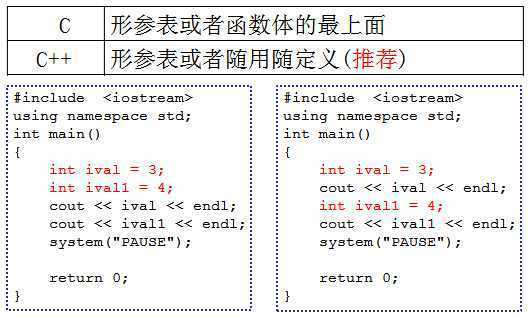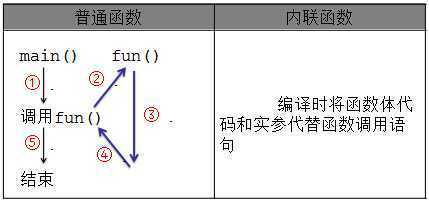标签:
本文地址:http://www.cnblogs.com/archimedes/p/cpp-change2.html,转载请注明源地址
原型声明的概念:
函数要先定义再使用,如果先使用后定义则必须使用原型声明
#include <iostream> using namespace std; int main() { float add(float x,float y);//原型声明 float a,b,c; cout << "Please enter a,b:"; cin >> a >> b; c = add(a, b); cout << "sum=“ << c << endl; return 0; } float add(float x,float y) { float z; z = x+y; return z; }
注意:
①声明语句必须加分号!
②位置任意,只是作用域不同
③声明的原因就是告诉编译环境函数参数的个数,类型和顺序
④C和C++中,任何类型的函数先使用后定义都需原型声明!
区别:原型为空的含义不同
void fun(); void fun(void);
C++:认为两种形式都无参
C:认为第一个可能有多个参数第二个无参

#include <iostream> #include <string> #include <iomanip> using namespace std; int sum = 5050; int main() { int arr[3], i; cout<<"input 3 num:"<<endl; for(i=0; i<3; i++) cin>>arr[i]; int sum = 0; for(i=0; i<3; i++) sum += arr[i]; for(i=0; i<3; i++) cout<<setw(4)<<arr[i]<<endl; cout << "局部sum=" << sum << endl; ::sum += sum; cout << "全局sum="; cout << ::sum <<endl; system("PAUSE"); return 0; }
含义:形参有初值的函数
#include <iostream> #include <string> #include <iomanip> using namespace std; void fun(int i, int j = 5, int k = 10); int main() { fun(20); fun(20, 30); fun(20, 30, 40); system("PAUSE"); return 0; } void fun(int i, int j, int k) { cout<<"i="<<i <<" j="<<j <<" k="<<k <<endl; }

注意:
1、有默认参数值的参数必须在参数表的最右端;
int f(int a,int b=0,int c); //×
2、必须在函数调用前将默认值通知编译系统;
3、声明和定义同时给出默认值,有些编译器报错,有些不会。最好只在函数声明时给出默认值;
4、有默认值的形参,调用时给出了实参,则实参值优先
#include <iostream> using namespace std; int max(int a, int b, int c=6); int main() { int result = 0; result = max(3,4,5); cout<<result<<endl; system("PAUSE"); return 0; } int max(int a, int b, int c) { int t; t = a > b ? a : b; c = c > t ? c : t; return c; }
1、调用方式

2、定义方法:在函数最左端加inline
#include <iostream> using namespace std; inline int max(int a, int b, int c); int main() { int i=10,j=20,k=30,m; m=max(i,j,k); cout<<"max="<<m<<endl; system("PAUSE"); return 0; } int max(int a, int b, int c) { int t; t = a > b ? a : b; c = c > t ? c : t; return c; }
注意:
可在定义和声明函数时同时写inline,也可在一处写inline
只将规模很小且使用频繁的函数定义成内联函数
内联函数中不能包含复杂的控制语句
对函数作inline声明是建议性的,并非一经指定为inline就一定当内联函数处理
总之规模小,使用频繁的函数适合作为inline
类内定义的成员函数都将理解为inline,前面无需加inline
类内声明,类外定义的函数默认并非inline
重载的前提:发生在同一个作用域中的才是重载
因为C++中函数中局部声明的名字将屏蔽在全局作用域内声明的名字!
#include <iostream> using namespace std; int square(int x) { return x*x; } float square(float x) { return x*x; } double square(double x=1.5) { return x*x; } int main() { cout<<"square()" <<square()<<endl; cout<<"square(10)" <<square(10)<<endl; cout<<"square(2.5f)" <<square(2.5f)<<endl; cout<<"square(1.1)" <<square(1.1)<<endl; system("PAUSE"); return 0; }
注意:
①重载函数的参数个数,参数类型,参数顺序3者中必须至少有一种不同,返回值不同不作为重载依据
②重载函数的功能应该相近
③main()函数不能重载
④参数类型最好保证一致,不一致会自动转换但转换不成功会报错
#include <iostream> using namespace std; int fun(int x, int y=10) { return x*y; } int fun(int x) { return x; } int main() { fun(5);//error:对重载函数的调用不明确 system("PAUSE"); return 0; }
标签:
原文地址:http://www.cnblogs.com/archimedes/p/cpp-change2.html